Archived Commercial Blog Posts
Building an Emergency Kit
12/17/2021 (Permalink)
Be prepared at your home or business with an Emergency Kit. Ready.gov suggest you have enough supplies to last for at least three days. Below are some suggested items to include in your kit.
-3-day supply of non-perishable foods
- Water (one + gallon per person day)
- First-aid kit
- Prescription medication
-Sleeping bag or blankets
- Fire extinguisher
-Hygiene products
-Flashlights
-Extra batteries
-Cell phone charger
-Matches in a waterproof container
-Wrench or pliers to turn off utilities.
-Whistle to signal for help
-Pet supplies
-Infant formula and diapers
-Important documents such as insurance policies, IDs, and bank records in a plastic container.
In the event of a natural disaster or emergency event were to hit Maryville/Alcoa. SERVPRO of Blount County is here to help. Our highly trained employees know how to restore your home or business in a timely manor. Give us a call at 865-982-2332.
Commercial Disinfecting & Cleaning
12/17/2021 (Permalink)
When it comes to commercial cleanings in todays age, it’s not something anyone takes lightly. People who work in factory environments are typically in close proximity to one another during their work hours. Right now with The flu and covid-19 going around it’s important for everyone to maintain a safe distance and for these people social distancing may be difficult. That’s why the fogging and disinfecting revives we provide are so important. We care about your employees' health as much as you do. In fact in a recent study conducted by SERVPRO 87% of people state that how a company handles cleanliness during COVID-19 is a direct reflection of the business itself.
At SERVPRO of Blount County we work quickly and efficiently so your staff and customers can get back in your building. We always want our customers to feel heard during this process. We have highly trained professionals who know the latest techniques and best strategies when it comes to cleaning your office or commercial building. Our products are hospital grade and EPA-approved. The CDC recommends cleaning high-touch surfaces such as counters, tables, doorknobs, light switches, bathroom fixtures, toilets, phones, keyboards, tablets and computers. Other spaces mentioned in the CDC guidance for commercial spaces include:
- Kitchen/Food Areas
- Bathrooms
- Schools/Classrooms
- Offices
- Retail Spaces
- Water Fountains
- Shelving
- Counters
- Carpets/Rugs
- Handrails
- Elevators
- Playground Equipment
- Fitness Equipment
SERVPRO of Blount County can help you and your business get back to doing what you do best. Call us today for your commercial cleaning.
Destroy Odors with DEODORIZATION
11/29/2021 (Permalink)
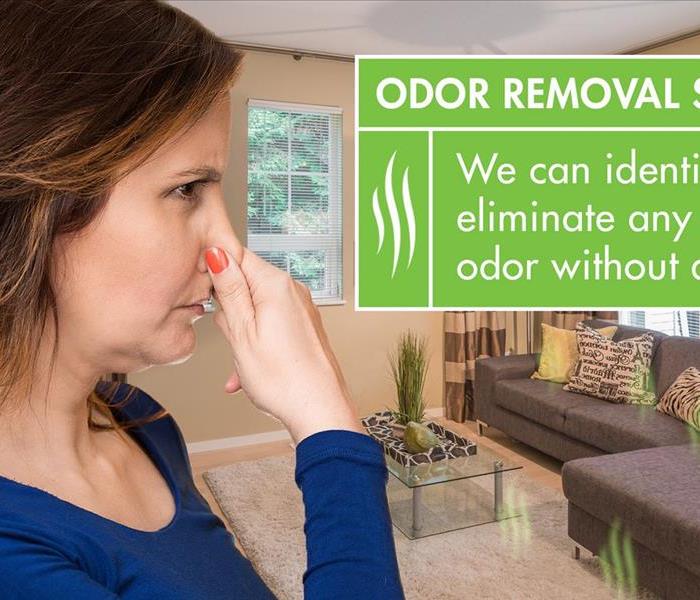 Smelly odor can be a turn off! SERVPRO can make it "Like it never even happened."
Smelly odor can be a turn off! SERVPRO can make it "Like it never even happened."
Even a small fire can cause odors for years to come if the affected
areas are not properly cleaned and deodorized. Fire, smoke and soot
damage in your home or business can create unpleasant and potentially
permanent problems. As various materials burn, the smoke produced travels throughout the structure, leaving odorous residues and deposits on surfaces and in hard-to-reach places. Unless fast, professional action is taken, these residues and deposits can cause permanent damage to contents and may result in resurfacing odors.
With technicians certified by the Institute of Inspection, Cleaning, and Restoration (IICRC), SERVPRO® Of Blount County provide specialized services that can rid your home or business of offensive odors left by fire or smoke damage. SERVPRO® Of Blount County does not cover up lingering odors with a fragrance; they seek out and remove the sources of the odor. Eliminating your odor and making it "Like it never even happened."
If you or a customer suffer a fire damage or some other accident and require deodorization services, contact SERVPRO® Of Blount County! Whether it’s fire, water, or mold damage, or just a stubborn odor that refuses to go away, we’ll help make it “Like it never even happened.”
NADCA (National Air Duct Cleaners Association) FAQs
11/29/2021 (Permalink)
NADCA had some fantastic frequently asked questions so I had to share...
Are there any health benefits that come from HVAC system cleaning?
Heating, ventilation, and air conditioning (HVAC) systems have been shown to collection a variety of contaminants such as mold, fungi, bacteria and very small particles of dust that have the potential to affect overall health, The removal of such contaminants from the HVAC system and home should be considered one component in an overall plan to improve indoor air quality.
How can I determine if the HVAC system cleaning was effective?
The best way to determine if the HVAC system cleaning was effective is to perform a visual inspection of the system before and after cleaning. If any dust or debris can be seen during the visual inspection, the system should not be considered cleaned. While you can perform your own visual inspection using a flashlight and mirror, a professional cleaning contractor should be able to allow you better access to system components and perhaps the use of specialized inspection tools. In addition, following the Residential Cleaning Checklist can help to ensure a top quality job.
How often should residential HVAC systems be cleaned?
Frequency of cleaning depends on several factors, not the least of which is the preference of the homeowner. Some of the things that may lead a homeowner to consider more frequent cleaning include:
- smokers in the household
- pets that shed high amounts of hair and dander
- water contamination or damage to the home or HVAC system
- residents with allergies or asthma who might benefit from a reduction in the amount of indoor air pollutants in the home’s HVAC system
- after home renovations or remodeling
- prior to occupancy of a new home.
How should a residential HVAC system be cleaned?
The most effective way to clean air ducts and ventilation systems is to employ source removal methods of cleaning. This requires a contractor to place the system under negative pressure, through the use of a specialized, powerful vacuum. While the vacuum draws air through the system, devices are inserted into the ducts to dislodge any debris that might be stuck to interior surfaces. The debris can then travel down the ducts to the vacuum, which removes it from the system and the home.
What are antimicrobial chemicals and why would they need to be used?
Antimicrobial chemicals are applied by some companies to the interior surface of the air ducts to treat microbial contamination such as fungi (mold), viruses or bacteria. Before any antimicrobial chemicals are used, the system should be thoroughly cleaned. It is critical that any antimicrobial treatment used in your system be registered by the U.S. Environmental Protection Agency specifically for use in HVAC systems. The use of antimicrobial chemicals is an additional service that is not part of a typical air duct cleaning project. Review the NADCA White Paper on Chemical Applications in HVAC Systems for more information.
What criteria should I use when selecting an HVAC system cleaning contractor?
You should interview as many local contractors as possible. Ask them to come to your home and perform a system inspection and give you a quote. To narrow down your pool of potential contractors, use the following pre-qualifications:
- Make sure the company is a member in good standing of NADCA.
- See if the company has been in business long enough to have adequate experience.
- Get proof that the company is properly licensed and adequately insured.
- Verify that the company is certified by NADCA to perform HVAC system cleaning.
- Make sure that the company is going to clean and visually inspect all of the air ducts and related system components.
- Avoid advertisements for “$99 whole house specials” and other sales gimmicks.
- Ask if the company has the right equipment to effectively perform cleaning and if the company has done work in homes similar to yours.
- Get references from neighbors if possible.
You can also use the Residential Cleaning Checklist as part of the contractor selection process.
What is the normal price range for the air duct cleaning service?
The U.S. Environmental Protection Agency says that “duct cleaning services typically – but not always – range in cost from $450 to $1,000 per heating and cooling system, depending on the services offered, the size of the system to be cleaned, system accessibility, climactic region and level of contamination” and type of duct material. Consumers should beware of air duct cleaning companies that make sweeping claims about the health benefits of duct cleaning, as such claims are unsubstantiated.
Consumers should also beware of “blow-and-go” air duct cleaning companies. These companies often charge a nominal fee and do a poor job of cleaning the heating and cooling system. These companies may also persuade the consumer to pay for unneeded services with and/or without their permission. (If you have knowledge of a practicing “blow-and-go” air duct cleaner, contact your local Better Business Bureau to report the company, and your local, federal and state elected officials to demand legislation.)
What kind of equipment is best for cleaning - truck mounted vacuums or portable vacuums?
NADCA does not endorse one kind of equipment over another. There are two main types of vacuum collection devices: (1) those mounted on trucks and trailers, and (2) portable units. Truck/trailer mounted equipment is generally more powerful than portable equipment. However, portable equipment can often be brought directly into a facility, allowing the vacuum source to be located closer to the ductwork. Both types of equipment will clean to ACR, the NADCA standard. All vacuum units should be attached to a collection device for safe containment prior to disposal. Any vacuum collection device which exhausts indoors must be HEPA filtered. A vacuum collection device alone will not get an HVAC system clean. The use of methods and tools designed to agitate debris adhered to the surfaces within the system, in conjunction with the use of the vacuum collection device(s), is required to clean HVAC systems. (For example: brushes, air whips and “skipper balls.”)
Why should I choose a NADCA member to have my air ducts cleaned?
NADCA members have signed a Code of Ethics stating they will do everything possible to protect the consumer and follow ACR, the NADCA Standard, for cleaning to the best of their ability. Find a NADCA professional near you. Air duct cleaning companies must meet strict requirements to become a NADCA member. Among those requirements, all NADCA members must have a certified Air System Cleaning Specialist (ASCS) on staff who has taken and passed the NADCA certification examination. Passing the exam demonstrates extensive knowledge in HVAC design and cleaning methodologies. ASCSs are also required to further their industry education by attending seminars in order to maintain their NADCA certification status. View the NADCA Code of Ethics.
Will HVAC system cleaning reduce our home energy bills?
Research by the U.S. Environmental Protection Agency has demonstrated that HVAC system cleaning may allow systems to run more efficiently by removing debris from sensitive mechanical components. Clean, efficient systems are less likely to break down, have a longer life span and generally operate more effectively than dirty systems.
If your building, office, or home needs to be professionally cleaned. Call your local SERVPRO of Blount County at (865)982-2332 to get scheduled today for your free evaluation!
Heating Hazard Maryville, TN
11/3/2021 (Permalink)
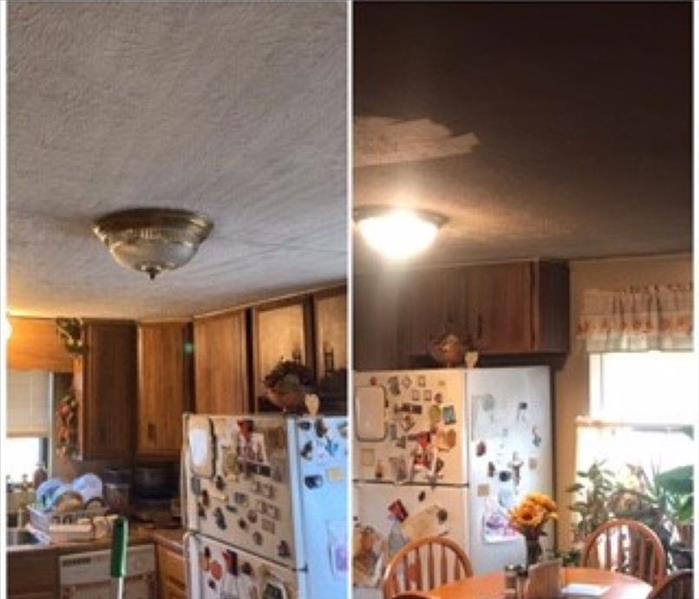 Before and after images of a local Alcoa, Tennessee fire damage after a heating furnace malfunctioned.
Before and after images of a local Alcoa, Tennessee fire damage after a heating furnace malfunctioned.
The winter season is here and with it comes shorter days and lower temperatures. No matter where you live, winter brings a change in the weather. To keep our homes and workplace cozy, many people use alternative heat sources like fireplaces, portable space heaters, and wood-burning stoves. Did you know, heating equipment is a leading cause of home fire deaths? According to the National Fire Protection Association, heating equipment fires caused an estimated $1 billion in direct property damage annually. Keep the following safety tips in mind to help reduce your risk of a heating-related fire.
- Keep anything flammable at least three feet away from heating equipment, like the furnace, fireplace, wood stove, or a portable space heater. Have a three-foot "kid-free zone" around open fires and space heaters.
- Make sure the fireplace has a sturdy screen to stop sparks from flying into the room. Ashes should be cold before putting them in metal containers. Keep the container a safe distance away from your home.
-Remember to turn portable heaters off when leaving the room or going to bed.
-Always use the right kind of fuel, specified by the manufacturer for fuel-burning space heaters.
- Have heating equipment and chimneys cleaned and inspected every year by a qualified professional.
- Have an adequate professional install stationary space heating equipment, water heaters, or central heating equipment according to the local codes and manufacturer's instructions.
-Test smoke alarms.
The Silent Threat
9/13/2021 (Permalink)
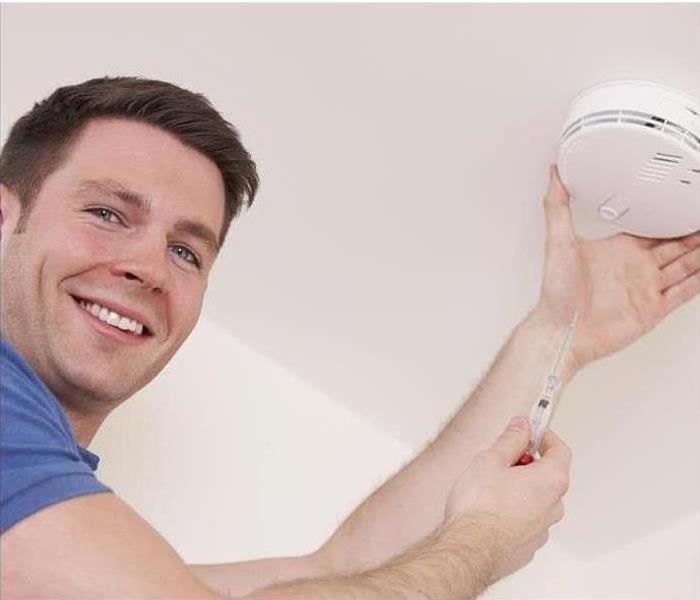 Make sure to consistently check your indoor alarm system for proper functionality
Make sure to consistently check your indoor alarm system for proper functionality
The Silent Killer
Carbon monoxide, considered “the silent killer,” is a gas you cannot see, taste, or smell. It can be created when fuels, such as kerosene, gasoline, coal, natural gas, propane, methane, or wood do not burn properly. According to U.S. Fire Administration, around 150 people die every year from accidental carbon monoxide (CO) poisoning. Often times, it is the result of faulty, improperly used or vented consumer products like furnaces, ranges, water heaters, room heaters, and engine-powered equipment, such as portable generators. However, there are precautions you can take to help protect yourself, your family and your employees from deadly CO fumes.
Reduce the chance of CO exposure in your workplace by performing regular maintenance on equipment and appliances that can produce CO. Consider switching from gasoline-powered equipment to equipment powered by electricity or batteries. Prohibit the use of gasoline-powered engines or tools in poorly ventilated areas.
To protect your home, install carbon monoxide detectors on every level of the home, including outside of all bedrooms. Consider having all fuel-burning heating equipment and chimneys serviced annually by a professional. Use portable generators only in well-ventilated areas away from doors, windows, vents and other openings to prevent fumes from entering the home or property.
Building an Emergency Kit
12/14/2020 (Permalink)
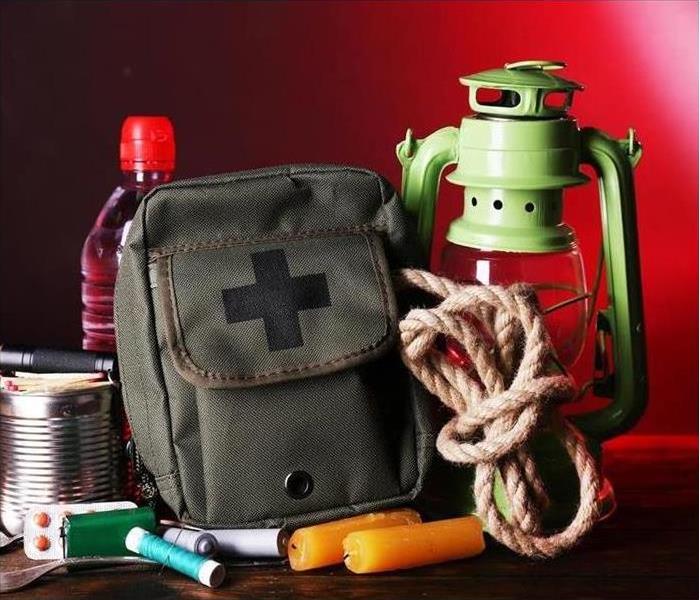 Emergency survival kit created by members of the Ready.gov emergency preparedness group
Emergency survival kit created by members of the Ready.gov emergency preparedness group
Be prepared at your home or business with an Emergency Kit. Ready.gov suggest you have enough supplies to last for at least three days. Below are some suggested items to include in your kit.
-3-day supply of non-perishable foods
- Water (one + gallon per person day)
- First-aid kit
- Prescription medication
-Sleeping bag or blankets
- Fire extinguisher
-Hygiene products
-Flashlights
-Extra batteries
-Cell phone charger
-Matches in a waterproof container
-Wrench or pliers to turn off utilities.
-Whistle to signal for help
-Pet supplies
-Infant formula and diapers
-Important documents such as insurance policies, IDs, and bank records in a plastic container.
In the event of a natural disaster or emergency event were to hit Maryville/Alcoa. SERVPRO of Blount County is here to help. Our highly trained employees know how to restore your home or business in a timely manor. Give us a call at 865-982-2332.
Commercial Disinfecting & Cleaning
12/14/2020 (Permalink)
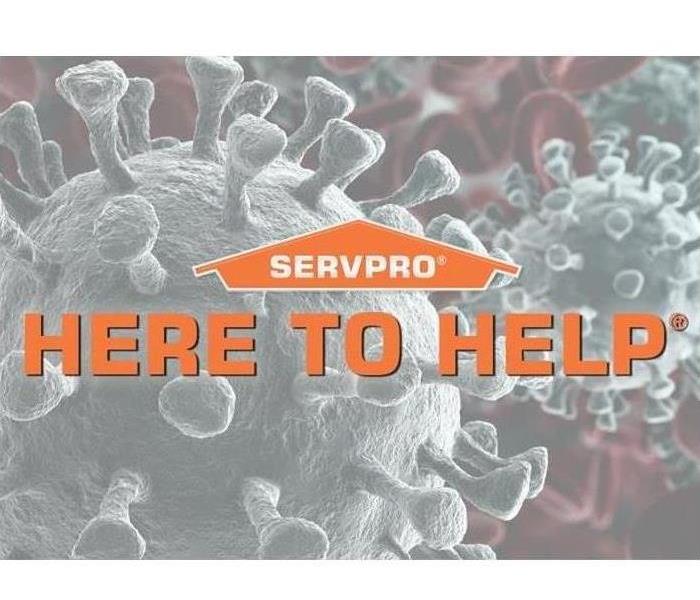 SERVPRO of Blount County is HERE TO HELP with commercial cleaning and disinfecting
SERVPRO of Blount County is HERE TO HELP with commercial cleaning and disinfecting
When it comes to commercial cleanings in todays age, it’s not something anyone takes lightly. People who work in factory environments are typically in close proximity to one another during their work hours. Right now with The flu and covid-19 going around it’s important for everyone to maintain a safe distance and for these people social distancing may be difficult. That’s why the fogging and disinfecting revives we provide are so important. We care about your employees' health as much as you do.In fact in a recent study conducted by SERVPRO 87% of people state that how a company handles cleanliness during COVID-19 is a direct reflection of the business itself.
At SERVPRO of Blount County we work quickly and efficiently so your staff and customers can get back in your building. We always want our customers to feel heard during this process. We have highly trained professionals who know the latest techniques and best strategies when it comes to cleaning your office or commercial building. Our products are hospital grade and EPA-approved. The CDC recommends cleaning high-touch surfaces such as counters, tables, doorknobs, light switches, bathroom fixtures, toilets, phones, keyboards, tablets and computers. Other spaces mentioned in the CDC guidance for commercial spaces include:
- Kitchen/Food Areas
- Bathrooms
- Schools/Classrooms
- Offices
- Retail Spaces
- Water Fountains
- Shelving
- Counters
- Carpets/Rugs
- Handrails
- Elevators
- Playground Equipment
- Fitness Equipment
SERVPRO of Blount County can help you and your business get back to doing what you do best. Call us today for your commercial cleaning.
Heating Hazard Maryville, TN
10/27/2020 (Permalink)
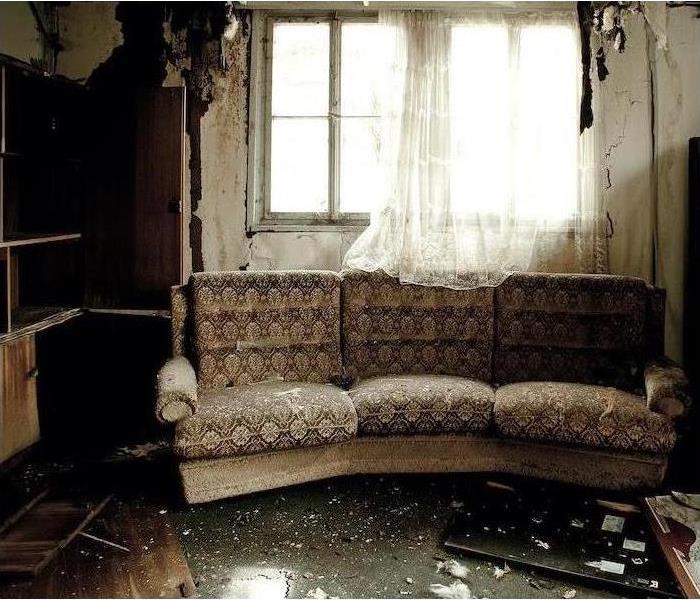 Fire damage in a Maryville, TN home.
Fire damage in a Maryville, TN home.
The winter season is here and with it comes shorter days and lower temperatures. No matter where you live, winter brings a change in the weather. To keep our homes and workplace cozy, many people use alternative heat sources like fireplaces, portable space heaters, and wood-burning stoves. Did you know, heating equipment is a leading cause of home fire deaths? According to the National Fire Protection Association, heating equipment fires caused an estimated $1 billion in direct property damage annually. Keep the following safety tips in mind to help reduce your risk of a heating-related fire.
- Keep anything flammable at least three feet away from heating equipment, like the furnace, fireplace, wood stove, or a portable space heater. Have a three-foot "kid-free zone" around open fires and space heaters.
- Make sure the fireplace has a sturdy screen to stop sparks from flying into the room. Ashes should be cold before putting them in metal containers. Keep the container a safe distance away from your home.
-Remember to turn portable heaters off when leaving the room or going to bed.
-Always use the right kind of fuel, specified by the manufacturer for fuel-burning space heaters.
- Have heating equipment and chimneys cleaned and inspected every year by a qualified professional.
- Have an adequate professional install stationary space heating equipment, water heaters, or central heating equipment according to the local codes and manufacturer's instructions.
-Test smoke alarms.
2022 Resolution
10/27/2020 (Permalink)
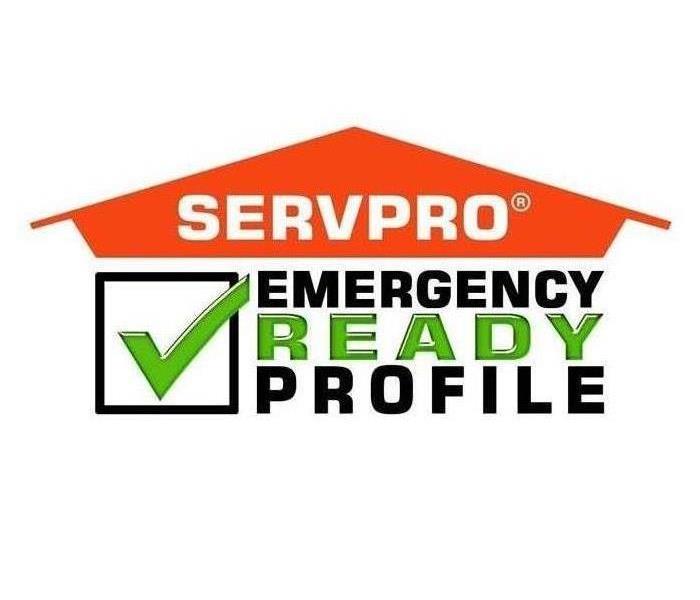 Emergency Readiness Profile
Emergency Readiness Profile
With each new year, many people resolve to better themselves or some part of their life. This year, decide to be READY. Use 2021 as an example, no one ever plans on a disaster, but you can sure prepare for it. The SERVPRO of Blount County will help ensure you are "Ready for whatever happens' in 2022.
In the event of an emergency, the ERP can help minimize business interruption by having an immediate plan of action in place for your facility. The ERP is a comprehensive document containing critical information about your business, including emergency contacts, shut-off valve locations, and priority areas. The ERP also establishes SERVPRO of Blount County as your disaster mitigation and restoration provider, giving you access to over 45 years of experience. The ERP is a no-cost assessment; all it requires is a little time and money in the future. By downloading the free SERVPRO READY App, this information is stored electronically and can be accessed using your mobile device, putting help at your fingertips.
Preparation is the key to making it through any size disaster, whether it is a small water leak, a massive fire, or an area flood. Having a plan in place helps minimize the amount of time your business is inactive and get you back in the building following a disaster. Don't wait until disaster strikes--resolve to be READY iin 2022!
Storm Season Is Here
10/27/2020 (Permalink)
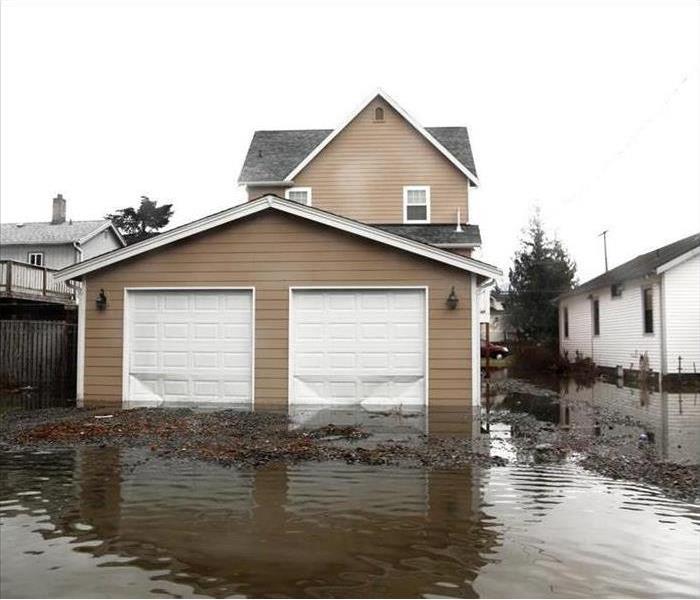 Flood damages after heavy storming in Maryville, TN
Flood damages after heavy storming in Maryville, TN
It may seem early but storm season is currently underway. The season begins June 1 and runs through November 30. The Eastern Pacific storm season began in mid-May and also ends November 30.
Storms can be life-threatening as well as cause serious property threatening hazards such as flooding, storm surge, high winds, and tornadoes. While the primary threat is in coastal areas. many inland areas can also be affected by these hazards, as well as by secondary events such as power outages as a result of high winds and landslides due to rainfall.
Preparation is the best protection against the dangers of a hurricane. Plan an evacuation route and your emergency plan, take inventory of your property, and take steps to protect your home and business. For more information and preparation tips, visit the Ready campaign website www.ready.gov
The Silent Killer
9/18/2020 (Permalink)
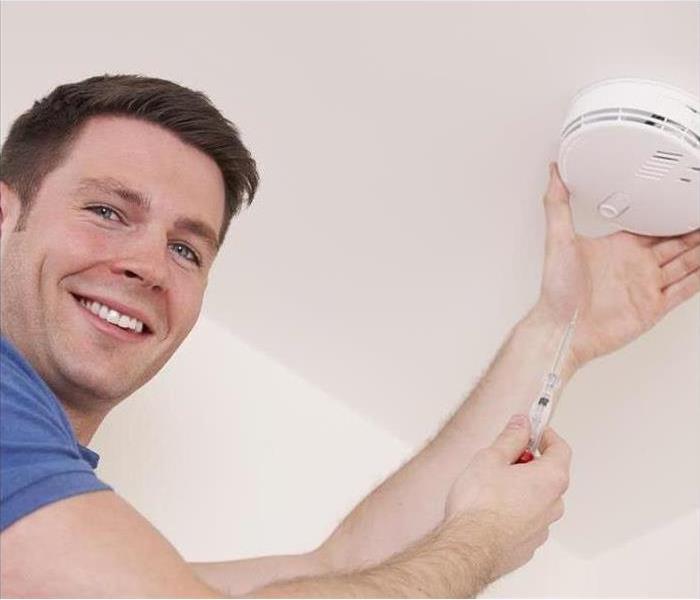 Make sure to consistently check your indoor alarm system for proper functionality
Make sure to consistently check your indoor alarm system for proper functionality
The Silent Killer
Carbon monoxide, considered “the silent killer,” is a gas you cannot see, taste, or smell. It can be created when fuels, such as kerosene, gasoline, coal, natural gas, propane, methane, or wood do not burn properly. According to U.S. Fire Administration, around 150 people die every year from accidental carbon monoxide (CO) poisoning. Often times, it is the result of faulty, improperly used or vented consumer products like furnaces, ranges, water heaters, room heaters, and engine-powered equipment, such as portable generators. However, there are precautions you can take to help protect yourself, your family and your employees from deadly CO fumes.
Reduce the chance of CO exposure in your workplace by performing regular maintenance on equipment and appliances that can produce CO. Consider switching from gasoline-powered equipment to equipment powered by electricity or batteries. Prohibit the use of gasoline-powered engines or tools in poorly ventilated areas.
To protect your home, install carbon monoxide detectors on every level of the home, including outside of all bedrooms. Consider having all fuel-burning heating equipment and chimneys serviced annually by a professional. Use portable generators only in well-ventilated areas away from doors, windows, vents and other openings to prevent fumes from entering the home.
Ready For Whatever Happens
10/21/2019 (Permalink)
Ready for whatever happens.
When a storm or disaster strikes, SERVPRO’s Disaster Recovery Team is poised and “Ready for whatever happens.” With a network of more than 1,700 franchises, the SERVPRO System strives to be faster to any size disaster. Strategically located throughout the United States, SERVPRO’s Disaster Recovery Team is trained and equipped to handle the most significant storms.
2016 Houston, TX Flooding: In April, a nearly stationary mesoscale convective system developed over Houston, resulting in widespread rainfall at the rate of 2.4 inches per hour. This was a historic flooding event for Harris County, which saw a total of nearly 18 inches of accumulated rainfall. The Storm Team dispatched 81 crews to over 360 jobs mitigating over $3 million in damages.
2015 Siberian Express: Record sub-zero temperatures caused significant problems for a large portion of the county stretching from Florida to Maine. The Midwest also experienced record-breaking low temperatures resulting in frozen pipes and ice dams, causing major problems for residents. The Storm Team dispatched a total of 257 crews from 108 Franchises to assist local SERVPRO Franchises completing 2000 jobs.
2014 Mid-Atlantic Flooding: Rainfall rates of up to 2 inches per hour caused major flash flooding stretching from Northeast Ohio up to Portland, Maine. Eastern Michigan and Baltimore, Maryland, were also impacted, and 173 crews mitigated over $4.3 million in damages while assisting the local Franchises.
2014 Polar Vortex: Record low temperatures caused by a break in the North Pole’s polar vortex resulted in an unprecedented freezing event, spanning from east of the Rocky Mountains to as far south as Central Florida, affecting all or part of 39 states and 70% of the SERVPRO Franchises System.
2013 Colorado Floods: Heavy rainfall, with amounts up 17 inches in some areas, resulted in widespread flooding in the Fort Collins, Boulder and surrounding Colorado mountain communities, The Disaster Recovery Team responded with 109 crews from Franchises to assist the local SERVPRO Franchises in the emergency response
2012 Hurricane Sandy: Affecting more than 20 states, Sandy left widespread damage and flooding from Florida stretching the entire eastern seaboard to Maine, The Disaster Recover Team placed nearly 1000 crews in the affected areas, representing over 300 SERVPRO Franchises from across the country. Teams traveled from as far as Arizona, California, Oregon, and Washington.
Heating Hazard Maryville TN
10/21/2019 (Permalink)
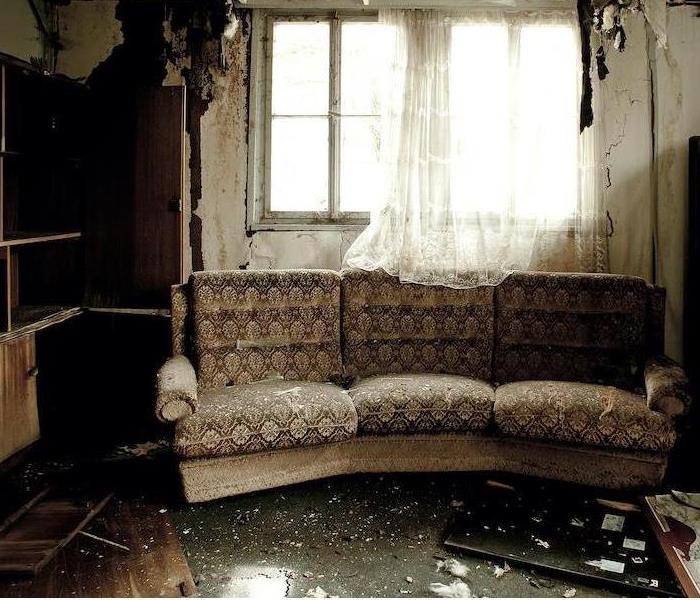 Fire Damage
Fire Damage
The winter season is here and with it comes shorter days and lower temperatures. No matter where you live, winter brings a change in the weather. To keep our homes and workplace cozy, many people use alternative heat sources like fireplaces, portable space heaters, and wood-burning stoves. Did you know, heating equipment is a leading cause of home fire deaths? According to the National Fire Protection Association, heating equipment fires caused an estimated $1 billion in direct property damage annually. Keep the following safety tips in mind to help reduce your risk of a heating-related fire.
- Keep anything flammable at least three feet away from heating equipment, like the furnace, fireplace, wood stove, or a portable space heater. Have a three-foot "kid-free zone" around open fires and space heaters.
- Make sure the fireplace has a sturdy screen to stop sparks from flying into the room. Ashes should be cold before putting them in metal containers. Keep the container a safe distance away from your home.
-Remember to turn portable heaters off when leaving the room or going to bed.
-Always use the right kind of fuel, specified by the manufacturer for fuel-burning space heaters.
- Have heating equipment and chimneys cleaned and inspected every year by a qualified professional.
- Have an adequate professional install stationary space heating equipment, water heaters, or central heating equipment according to the local codes and manufacturer's instructions.
-Test smoke alarms.
2020 Resolution: Plan Ahead
10/21/2019 (Permalink)
With each new year, many people resolve to better themselves or some part of their life. This year, decide to be READY. No one ever plans on a disaster, but you can prepare for it. The SERVPRO of Blount County will help ensure you are "Ready for whatever happens' in 2020.
In the event of an emergency, the ERP can help minimize business interruption by having an immediate plan of action in place for your facility. The ERP is a comprehensive document containing critical information about your business, including emergency contacts, shut-off valve locations, and priority areas. The ERP also establishes SERVPRO of Blount County as your disaster mitigation and restoration provider, giving you access to over 45 years of experience. The ERP is a no-cost assessment; all it requires is a little time and money in the future. By downloading the free SERVPRO READY App, this information is stored electronically and can be accessed using your mobile device, putting help at your fingertips.
Preparation is the key to making it through any size disaster, whether it is a small water leak, a massive fire, or an area flood. Having a plan in place helps minimize the amount of time your business is inactive and get you back in the building following a disaster. Don't wait until disaster strikes resolve to be READY.
Fire Prevention Month
9/4/2019 (Permalink)
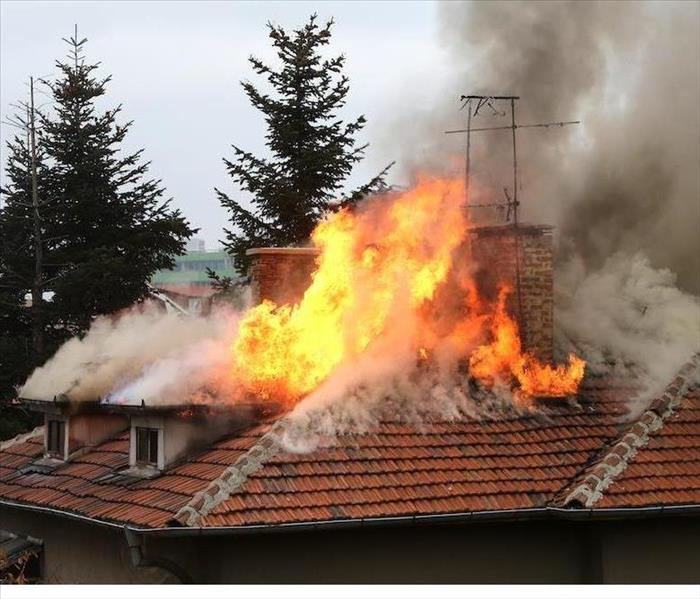 Fire Damage Maryville
Fire Damage Maryville
October is Fire Prevention Month a perfect time to examine emergency preparedness plans for your home and business, including your fire escape plan. Do you have a fire escape plan? Have you changed your smoke alarm batteries within the last year?
The National Fire Protection Association (NFPA) designates a week each October to focus on fire prevention awareness. The 2019 theme is “Not Every Hero Wears a Cape. Plan and Practice Your Escape” which works to educate everyone about the small but important actions they can take to keep themselves and those around them safe with the planning and practicing of a fire escape plan. In a typical home fire, you may have as little as one to two minutes to escape safely from the time the smoke alarm sounds. Escape planning and practice can help you make the most of the time you have,giving everyone enough time to get out.
SEPTEMBER IS NATIONAL PREPAREDNESS MONTH PREPARE NOW
9/10/2018 (Permalink)
This year for National Preparedness Month, join your community in preparing for emergencies and disasters of all types and leading efforts to encourage the community as a whole to become more prepared. “Disasters happen” and not only devastate individuals and neighborhoods but entire communities. Learn how to be prepared.
Make and Practice Your Plan
Do you have an evacuation and shelter-in-place plan? Do you have a plan to communicate with your family before, during and after an incident? Do you have an emergency supply kit?
Make sure your family is informed and practiced in your emergency plan. Be sure to sign up for alerts and warnings for your area, and download other necessary apps to stay informed, such as the FEMA app.
Learn Life Saving Skills
Do you or someone in your family know CPR? Could you turn off your natural gas if necessary? Do you know how to take cover in an earthquake? Knowing these life-saving skills could mean life or death in an emergency situation for you, your family or your neighbors.
Check your Insurance Coverage
Have you reviewed your insurance coverage recently to see if you’re covered in a disaster? Evaluate which hazards are relevant to your area and obtain the appropriate insurance for your home, business, or other property and become familiar with your coverage.
Save for an Emergency
Are you prepared financially in case of a disaster? Does your family have an emergency fund for unexpected expenses after a flood or fire? Check out FEMA’s Emergency Financial First Aid Kit for an in-depth document to help you identify and compile important documents and account information all in one spot. Just search “EFFAK” on fema.gov for the free PDF. Whether its flood, wildfire or extreme winter weather, we must work together as a team to help ensure our families, businesses, places of worship and neighborhoods are prepared. Contact your local SERVPRO® of Maryville and Alcoa to find out how they can help make it “Like it never even happened” if disaster strikes in your life.
National Day of Service and Remembrance SEPTEMBER 11, 2018
9/10/2018 (Permalink)
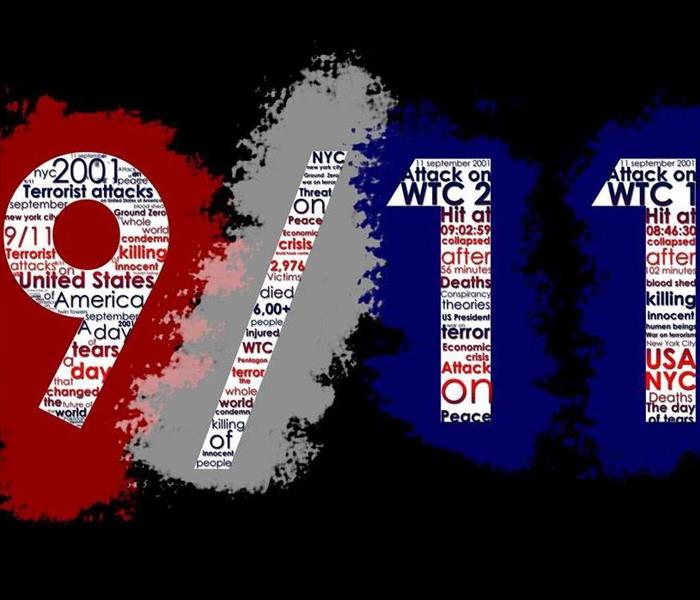 9/11
9/11
In honor and memory of those who died on September 11, 2001, as well as the survivors and First Responders, National Day of Service and Remembrance was established in 2009 as a day of reflection. Led by the Corporation for National and Community Service, this is a day to come together as Americans did following the events of 9/11 to help neighbors in need and to honor veterans and First Responders in your community.
On this day and every day, SERVPRO® salutes those heroes who arrive in the greatest times of need and stand strong in the face of disaster. These heroes are the First Responders who keep our communities safe in trying times.
Give back and make a difference in your community this year. To find a volunteer opportunity near you, or to register your National Day of Service and Remembrance event, visit nationalservice.gov/911day
Destroy Odors with DEODORIZATION
7/9/2018 (Permalink)
Even a small fire can cause odors for years to come if the affected
areas are not properly cleaned and deodorized. Fire, smoke and soot
damage in your home or business can create unpleasant and potentially
permanent problems. As various materials burn, the smoke produced travels throughout the structure, leaving odorous residues and deposits on surfaces and in hard-to-reach places. Unless fast, professional action is taken, these residues and deposits can cause permanent damage to contents and may result in resurfacing odors.
With technicians certified by the Institute of Inspection, Cleaning, and Restoration (IICRC), SERVPRO® Of Maryville and Alcoa provide specialized services that can rid your home or business of offensive odors left by fire or smoke damage. SERVPRO® Of Maryville and Alcoa do not cover up lingering odors with a fragrance; they seek out and remove the sources of the odor. If you or a customer suffer a fire damage or some other accident and require deodorization services, contact SERVPRO® Of Maryville and Alcoa. Whether it’s fire, water, or mold damage, or just a stubborn odor that refuses to go away, we’ll help make it “Like it never even happened.”
Build an Emergency Kit
7/8/2018 (Permalink)
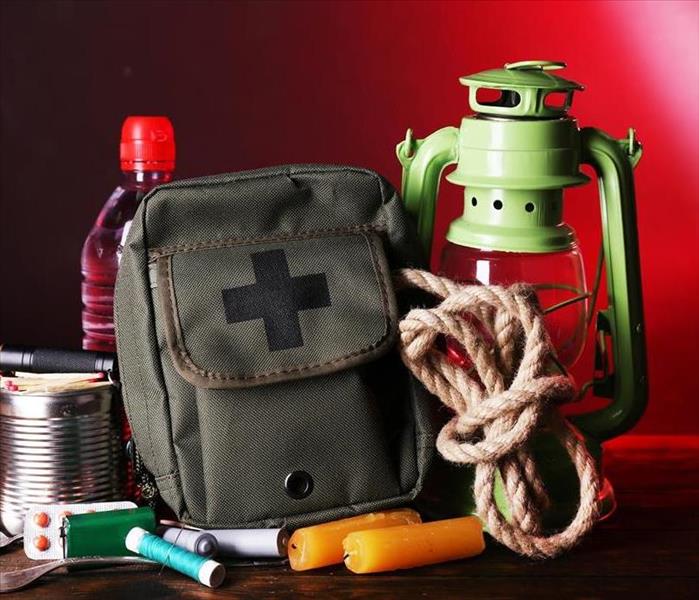 Emergency Kit
Emergency Kit
Be prepared at your home or business with an Emergency Kit. Ready.gov suggest you have enough supplies to last for at least three days. Below are some suggested items to include in your kit.
-3-day supply of non-perishable foods
- Water (one + gallon per person day)
- First-aid kit
- Prescription medication
-Sleeping bag or blankets
- Fire extinguisher
-Hygiene products
-Flashlights
-Extra batteries
-Cell phone charger
-Matches in a waterproof container
-Wrench or pliers to turn off utilities.
-Whistle to signal for help
-Pet supplies
-Infant formula and diapers
-Important documents such as insurance policies, IDs, and bank records in a plastic container.
SERVPRO of Blount County is here to help. Our highly trained employees know how to restore your home or business. Give us a call at 865-982-2332.
Storm Season Is Here
5/23/2018 (Permalink)
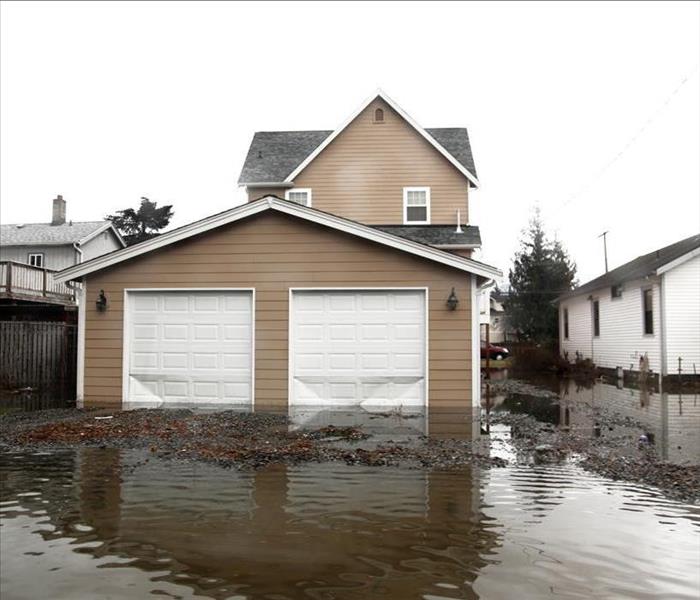 Storm Damage
Storm Damage
It may seem early but storm season is currently underway. The season begins June 1 and runs through November 30. The Eastern Pacific storm season began in mid-May and also ends November 30.
Storms can be life-threatening as well as cause serious property threatening hazards such as flooding, storm surge, high winds, and tornadoes. While the primary threat is in coastal areas. many inland areas can also be affected by these hazards, as well as by secondary events such as power outages as a result of high winds and landslides due to rainfall.
Preparation is the best protection against the dangers of a hurricane. Plan an evacuation route and your emergency plan, take inventory of your property, and take steps to protect your home and business. For more information and preparation tips, visit the Ready campaign website www.ready.gov
Hoarding: A Serious Situation
5/16/2018 (Permalink)
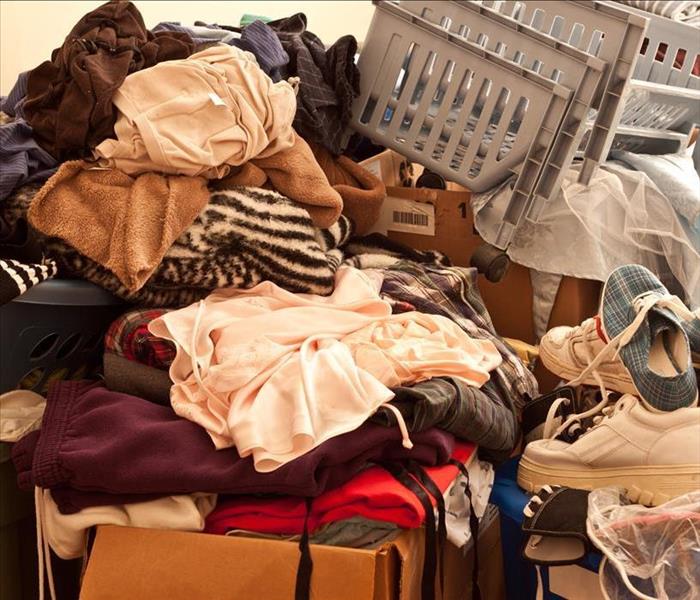 Hoarding
Hoarding
According to The Mayo Clinic,“Hoarding disorder is a persistent difficulty discarding or parting with possessions because of a perceived need to save them. A person with hoarding disorder experiences distresses at the thought of getting rid of the items. Excessive accumulation of
items, regardless of actual value, occurs.”
Many people with hoarding disorder do not find their habits to be a problem. Hoarded items are often things others would throw away or look
at as junk or garbage such as old newspapers, junk mail or packaging.
Hoarding can lead to homes filled with extreme clutter to full capacity from years of accumulation, making living conditions unsanitary and
crowded. Bugs, fleas, rats and other vermin may be present, at which point an exterminator would need to be called. At times, hoarding may spread to outside the home as well, to storage facilities, or even the garage or yard. SERVPRO® of Maryville and Alcoa encounter hoarding situations in several different ways. Often, SERVPRO® of Maryville and Alcoa is called for a fire or water loss and find the hoarding situation when they arrive on-site. A
SERVPRO® of Maryville and Alcoa Professional will communicate with the insurance company regarding their contents coverage, and after approval, contents can be packed out and possibly cleaned, dried, and stored by the SERVPRO® of Maryville and Alcoa, or relocated to a storage facility so work on the fire or water loss can begin. Another way SERVPRO® of Maryville and Alcoa encounter hoarding jobs is through calls from landlords, caseworkers, real estate agents, or family members, often after the death of a loved one. In these situations, the crew will see if they should look for any items of importance while they clean the job. Sometimes, family members will
come and try to help the hoarder sort through their contents as well.
Each case is very different, and hoarding jobs are often sensitive situations, but SERVPRO® of Maryville and Alcoa Professionals are here to help make it “Like it never even happened.” If you encounter a hoarding situation at one of your properties, or with your insureds, call SERVPRO® of Maryville and Alcoa today
Hurricane Harvey
9/26/2017 (Permalink)
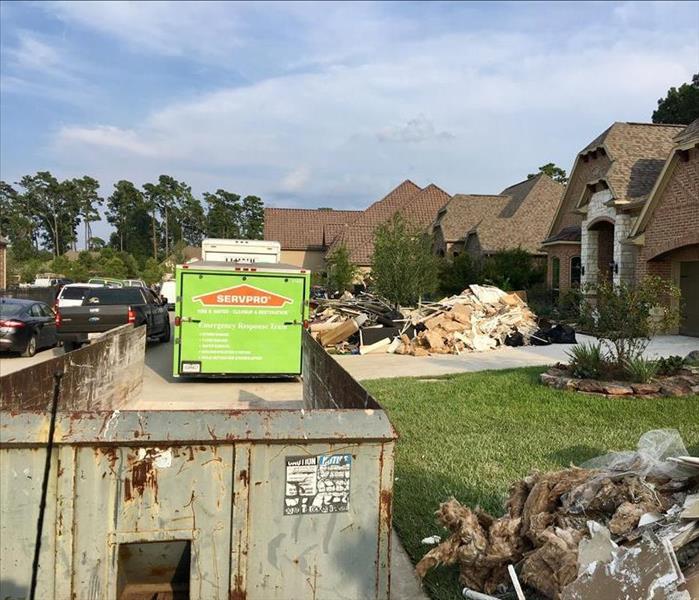 Hurricane Harvey Storm Damage
Hurricane Harvey Storm Damage
When Hurricane Harvey left his wake of destruction in Texas the Emergency Response Team from SERVPRO of Maryville/Alcoa answered the call sending teams to Kingwood, Texas. Taking supplies and equipment our teams went down to help the residents, and were humbled by the generosity of a community that didn’t have any clue how they were going to recover financially, much less emotionally from the impact of the storm. Rescuees were evacuated by boats from their homes and neighborhoods, leaving everything behind, but the spirit of giving and resilience impacted the teams from Maryville.
The long standing relationship between SERVPRO and the insurance companies helped our teams make a big impact and quickly. The insurance adjusters were recommending people call SERVPRO because it was a name that they could trust. Our teams were able to start water mitigation quickly and come alongside homeowners and other countless volunteers to help these families begin to get some semblance of recovery started.
Imagine your home with six to eight feet of standing water with the rescue boat pulling up outside and telling you it was last call. Our team was humbled time and time again meeting over a hundred different families that had met that fate and yet met our team with smiles on their faces. Unanimously our team was impacted by Texas Strong, and have spoken so highly of these families since their return.
“We are humbled and we are changed by so many families and their generosity, not only with their resources, but their encouragement and their prayers”, said Nathan Lloyd, our Business Development Manager.
SERVPRO of Maryville and Alcoa, are professionals at serving you. That is why we are here, and that is what we do.
Disaster Response - Plan for it with the SERVPRO ERP
9/22/2017 (Permalink)
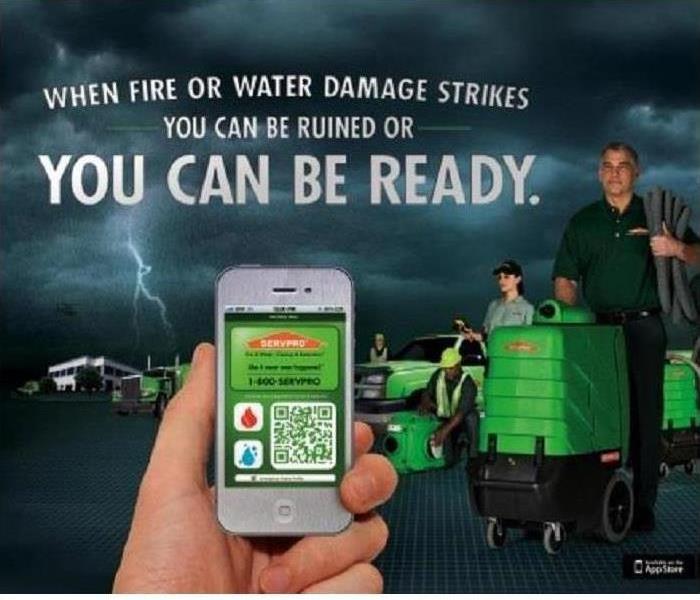 SERVPRO can help!
SERVPRO can help!
Disaster strikes. But never when you expect it to. Be smart and plan ahead for water or fire damage.
SERVPRO of West Knoxville/Concord is proud to offer the Emergency Ready Plan (ERP), a great tool in preparing your commercial business for the worst-case scenario. The ERP works as a data collection source, storing all your important and vital information in one place: at your fingertips.
Never be lost or without key account, contact, and utility information again. The ERP app works seamlessly on computers, smartphones, and tablets. And since it's cloud based, all platforms are constantly synced together.
SERVPRO representatives will implement this service free of charge at your place of business. We will help you gather all information you may need in the event of an emergency, have all company contacts on file, and include pictures and locations of all shutoffs for utilities.
Water and fire damage can wreak havoc, but SERVPRO and the ERP app help you get back into business quicker, safer, and with less worry of losing vital information. Call today for a live demonstration over a computer, or live in person at your facility. 865-690-9658
Learn more about commercial services and disaster recovery here.
The Silent Killer
6/22/2017 (Permalink)
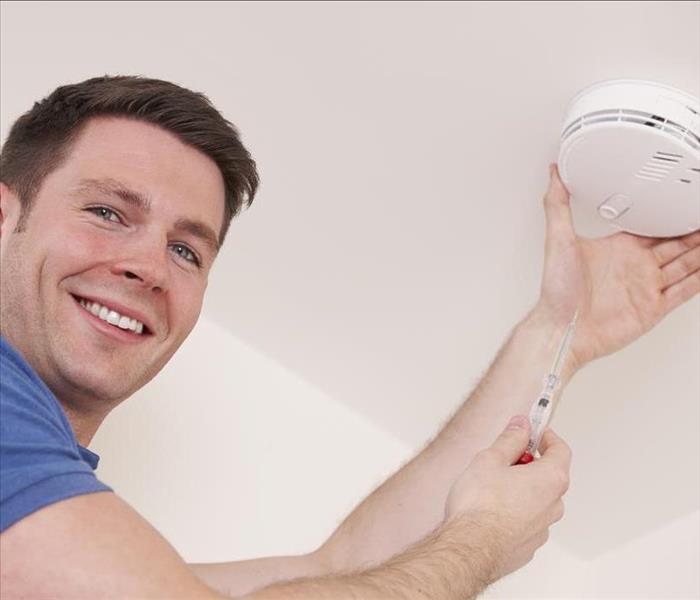 Smoke Detector
Smoke Detector
The Silent Killer
Carbon monoxide, considered “the silent killer,” is a gas you cannot see, taste, or smell. It can be created when fuels, such as kerosene, gasoline, coal, natural gas, propane, methane, or wood do not burn properly. According to U.S. Fire Administration, around 150 people die every year from accidental carbon monoxide (CO) poisoning. Often times, it is the result of faulty, improperly used or vented consumer products like furnaces, ranges, water heaters, room heaters, and engine-powered equipment, such as portable generators. However, there are precautions you can take to help protect yourself, your family and your employees from deadly CO fumes.
Reduce the chance of CO exposure in your workplace by performing regular maintenance on equipment and appliances that can produce CO. Consider switching from gasoline-powered equipment to equipment powered by electricity or batteries. Prohibit the use of gasoline-powered engines or tools in poorly ventilated areas.
To protect your home, install carbon monoxide detectors on every level of the home, including outside of all bedrooms. Consider having all fuel-burning heating equipment and chimneys serviced annually by a professional. Use portable generators only in well-ventilated areas away from doors, windows, vents and other openings to prevent fumes from entering the home.






 24/7 Emergency Service
24/7 Emergency Service

















